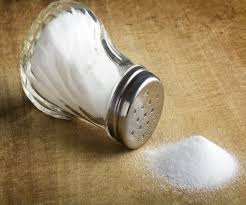- Home
- Editorial
- News
- Practice Guidelines
- Anesthesiology Guidelines
- Cancer Guidelines
- Cardiac Sciences Guidelines
- Critical Care Guidelines
- Dentistry Guidelines
- Dermatology Guidelines
- Diabetes and Endo Guidelines
- Diagnostics Guidelines
- ENT Guidelines
- Featured Practice Guidelines
- Gastroenterology Guidelines
- Geriatrics Guidelines
- Medicine Guidelines
- Nephrology Guidelines
- Neurosciences Guidelines
- Obs and Gynae Guidelines
- Ophthalmology Guidelines
- Orthopaedics Guidelines
- Paediatrics Guidelines
- Psychiatry Guidelines
- Pulmonology Guidelines
- Radiology Guidelines
- Surgery Guidelines
- Urology Guidelines
Higher salt intake may lead to gastrointestinal bloating, reveals study

A study led by researchers at the Johns Hopkins Bloomberg School of Public Health found that individuals reported more gastrointestinal bloating when they ate a diet high in salt. The study was published June 17 in the American Journal of Gastroenterology.
Bloating is estimated to affect up to a third of U.S. adults overall, and more than 90 per cent of those with irritable bowel syndrome. Bloating features a buildup of excess gas in the gut. The production of gas can be attributed to gas-producing gut bacteria breaking down fiber. There is also some evidence that sodium can stimulate bloating. The study by Mueller and colleagues is the first to examine sodium as a cause of bloating in the context of low- and high-fibre diets.
The scientists re-analyzed data from a large clinical trial--the Dietary Approaches to Stop Hypertension-Sodium trial (DASH-Sodium)--conducted two decades ago, and found that high sodium intake increased bloating among trial participants. The researchers also found that the high-fibre DASH diet increased bloating among trial participants compared to a low-fibre control diet.
"Bloating is one of the leading gastrointestinal complaints in the U.S. and can be exacerbated in some people by a high-fiber diet; our results suggest that they might be able to reduce that bloating, without compromising on healthy fiber, by lowering their sodium intake," says study senior author Noel Mueller, PhD, MPH, an assistant professor in the Department of Epidemiology at the Bloomberg School.
The study analyzed data from the DASH-Sodium trial, which was co-led by Bloomberg School researcher Lawrence Appel, MD, MPH, and sponsored by the National Heart, Lung and Blood Institute. Conducted at four clinical centers during 1998-99, it tested the DASH diet, a high-fiber diet which is relatively low in fat and high in fruits, nuts, and vegetables, against a low-fiber control diet. Each of the two diets was tested at three levels of sodium, and the 412 participants all had high blood pressure at the trial start. The trial was set up chiefly to determine the effect of dietary sodium and other factors on blood pressure, but included data on participants' reports of bloating--data that Mueller and colleagues analyzed for the new study.
The team found that prior to the trial, 36.7 percent of the participants reported bloating, which is more or less in line with national surveys of bloating prevalence. They found too that the high-fiber DASH diet increased the risk of bloating by about 41 percent, compared to the low-fiber control diet--and men were more susceptible to this effect, compared to women. But the scientists also determined that sodium was a factor in bloating. When they combined data from the DASH and control diets, and compared the highest level of sodium intake to the lowest, they found that the high-sodium versions of those diets collectively increased the risk of bloating by about 27 percent compared to the low-sodium versions.
The key implication is that reducing sodium can be an effective way to reduce bloating--and in particular may be able to help people maintain a healthy, high-fiber diet.
How sodium causes bloating is still being studied. Salt causes water retention, and that may be one factor. "We hypothesize that sodium intake also alters the gut microbiome in a manner that modifies bacterial sulfide production," Mueller says.
He and his team are now researching how bloating is affected by the major dietary macronutrients: protein, carbs, and fat.

Disclaimer: This site is primarily intended for healthcare professionals. Any content/information on this website does not replace the advice of medical and/or health professionals and should not be construed as medical/diagnostic advice/endorsement or prescription. Use of this site is subject to our terms of use, privacy policy, advertisement policy. © 2020 Minerva Medical Treatment Pvt Ltd